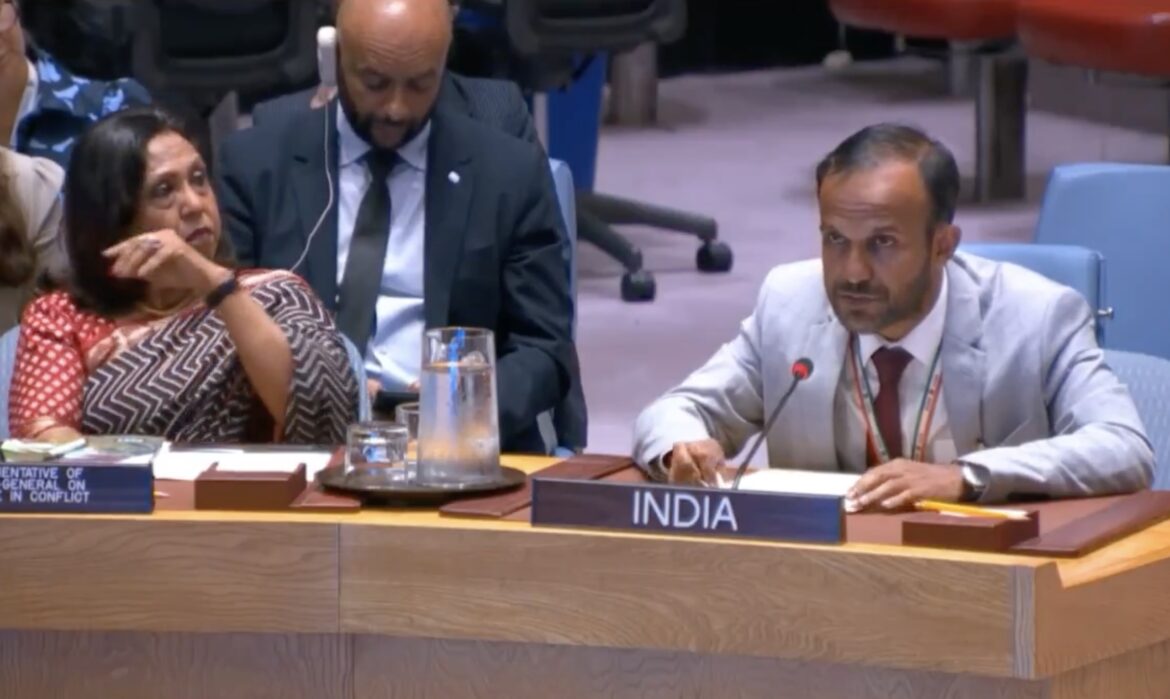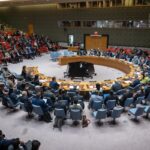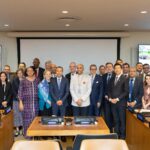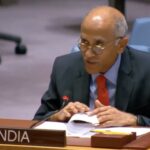Counsellor and Chargé d’Affaires of the Permanent Mission of India to the United Nations, Eldos Mathew Punnoose, stressed India’s strong stance against conflict-related sexual violence during the UN Security Council Open Debate on “Innovative Strategies to Ensure Access to Life-Saving Services and Protection for Survivors of Sexual Violence in Conflict Zones.”
“Perpetrators of heinous acts of conflict-related sexual violence must be condemned in the strongest possible terms and brought to justice,” Punnoose declared, underscoring the gravity of the issue. He thanked Panama, the current President of the Security Council, for leading the initiative to hold this debate.
Punnoose noted that sexual violence in conflict zones not only devastates individuals but also “tears apart the very fabric of societies, leaving lasting scars on communities for generations.” He emphasized the need for a multi-faceted approach that includes prosecuting and deterring crimes, ensuring no impunity for perpetrators, and adopting survivor-centric strategies in both prevention and response.
Referencing UNSC Resolution 2467 (2019), he highlighted its role in ensuring survivors’ access to healthcare, psychosocial support, safe shelter, legal aid, rehabilitation, and reintegration programs. He further stressed the importance of the Secretary-General’s Trust Fund in Support of Victims of Sexual Exploitation and Abuse, noting that “India was among the first nations to contribute to this Fund and remains committed to support such victims.”
He recalled that in November 2017, India signed a voluntary compact with the UN Secretary-General to eliminate sexual exploitation and abuse in peacekeeping, humanitarian, and development work. “Underlining the seriousness attached to the issue by India, Prime Minister Modi joined the Circle of Leadership on the prevention of and response to sexual exploitation and abuse in United Nations operations,” he added.
Drawing from India’s peacekeeping experience, Punnoose said that the country’s Female Engagement Teams have been instrumental in addressing gender-sensitive issues, engaging with victims, and enhancing operational effectiveness.
“In 2007, we were the first country to deploy an all-women Formed Police Unit (FPU) to the UN Mission in Liberia. Today, we have successfully deployed female contingents in MONUSCO (Democratic Republic of the Congo), UNISFA (Abyei), and UNMISS (South Sudan), with the objective of addressing conflict-related sexual violence,” he said.
He also highlighted the role of the Centre for United Nations Peacekeeping (CUNPK) in New Delhi, which conducts specialized training to increase women’s participation in peacekeeping operations and provide targeted instruction on preventing and addressing sexual and gender-based violence in armed conflicts. India, he added, stands ready to share this expertise with interested Member States.
Punnoose pointed to India’s domestic framework on women’s safety as a model that could inform international approaches:
- Dedicated Resources: The Nirbhaya Fund, a non-lapsable fund of approximately $1.2 billion, is dedicated to women’s safety, legislation enforcement, and infrastructure for justice and crisis support.
- Response Mechanisms: A nationwide Emergency Response Support System (112) and Sakhi-One Stop Centres provide immediate assistance, medical care, legal aid, shelter, and rehabilitation.
- Justice Delivery: Specialized training for investigators, prosecutors, and medical officers, coupled with Fast Track Special Courts, ensures efficient handling and swift disposal of cases.
During his address, Punnoose also rebutted claims raised by Pakistan. “I would like to briefly address the baseless allegation raised by the delegate of Pakistan. The utter impunity with which the Pakistan army perpetrated heinous crimes of gross sexual violence against women in erstwhile East Pakistan in 1971 is a matter of shameful record,” he said.
He stressed that this “deplorable pattern continues unabated,” citing abduction, trafficking, forced marriages, sexual violence, and forced religious conversions targeting women and girls from minority communities, well-documented in recent reports by the Office of the High Commissioner for Human Rights (OHCHR).
“It is ironical that those who perpetrate these crimes are now masquerading as champions of justice. The duplicity and hypocrisy is self-evident,” Punnoose stated, reaffirming India’s unwavering commitment to eliminate sexual violence in conflict and provide justice and support to survivors.






